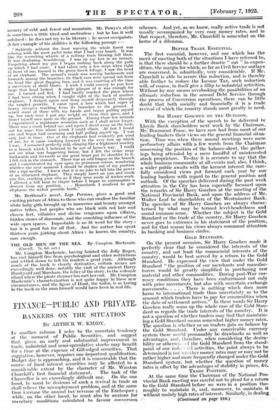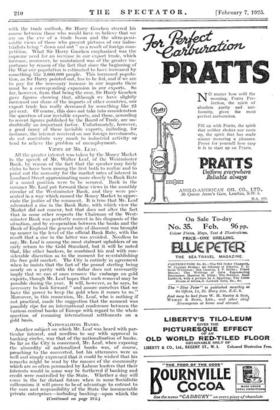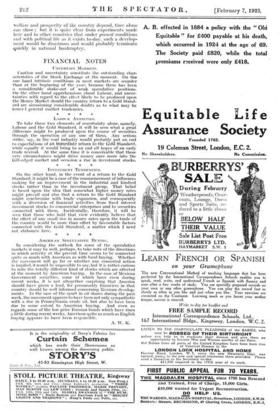FINANCE - PUBLIC AND PRIVATE.
BANKERS ON THE SITUATION
BY ARTHUR W. KIDDY.
IN another column I refer to the uncertain tendency at the moment of Public Securities, and suggest that, given an early and substantial improvement in trade, industrial and semi-speculative stocks may benefit for a time at the expense of Gilt-edged securities. That suggestion, however, requires one important qualification. Budget day is approaching, and it is conceivable that the course of fixed interest securities may be affected to a considerable extent by the character of Mr. Winston Churchill's first financial statement. The task of the Chancellor is an exceedingly difficult one. . On the one hand, he must be desirous of such a revival in trade as shall relieve the unemployment problem, and at the same time increase the annual tax- revenue of the Exchequer ; while, on the other hand, he must also be anxious for mtnetary conditions calculated to favour conversion schemes. And yet, as we know, really active trade is not usually accompanied by very easy money rates, and in that respect, therefore, Mr. Churchill is somewhat on the horns of a dilemma.
BETTER TRADE ESSENTIAL:
The first essential, however, and one which has the merit of meeting both of the situations I have referred to, is that there should be a further drastic" cut "iii expen- diture, the margin for which, so far as Civil Service outlays are concerned, is, admittedly, very considerable. If Mr. Churchill is able to secure this reduction, and is thereby able further to reduce the Income Tax, such reduction will, of course, in itself give a fillip to industrial activities. Without by any means overlooking the possibilities of an ultimate reduction in the annual Debt Service through the process of Conversion operations, there can be little doubt that both socially and financially it is a trade revival of which the country stands most greatly in need.
SIR HARRY GOSCHEN ON THE OUTLOOK.
With the exception of the speech to be delivered to Lloyds Bank shareholders next week by the Chairman, Mr. Beaumont Pease, we have now had from most of our leading bankers their views on the general financial situa- tion. Time was when these annual meetings were mere perfunctory affairs with a few words from the Chairman concerning the position of the balance-sheet, the gather- ings being attended by a mere handful of uninterested stock proprietors. To-day it is accurate to say that the whole business community at all events and, also, I think, a wider public awaits with the keenest interest the care- fully considered views put forward each year by our leading bankers with regard to the general position and outlook. Of the speeches delivered during the past week attention in the City has been especially focussed upon the remarks of Sir Harry Goschen at the meeting of the National Provincial Bank, and upon the address of Mr. Walter Leaf to shareholders of the Westminster Bank. The speeches of Sir Harry Goschen are always charac- terised by what may be termed level-headedness and sound common sense. Whether the subject is the Gold Standard or the trade of the country, Sir Harry Goschen never goes to extremes in his statement of the position, and for that reason his views always command attention in banking and business circles.
GOLD STANDARD.
On the present occasion, Sir Harry Goschen made it perfectly clear that he considered the interests of the country, and not least the commercial interests of the country, would be best served by a return to the Gold Standard. He expressed the view that under the Gold Standard "the position of our merchants and manufac- turers would be greatly simplified in purchasing raw material and other commodities. During post-War cur- rency conditions they have been embarrassed not only with price movements, but also with uncertain exchange movements There is nothing which does more harm to international trade than uncertainty as to the amount which traders have to pay for commodities when the date of settlement arrives.' In these words Sir Harry Goschen really sums up the whole case of the Gold Stan- dard as regards the trade interests of the country. It is not a question of whether traders may find that maintain- ing a Gold Standard means somewhat higher money rates. The question is whether or no traders gain on balance by. the Gold Standard. Under any conceivable currency system there wou!d presumably be drawbacks as well as advantages, and, therefore, when considering the desira- bility or otherwise of the Gold Standard from the stand- point of our indu - activities, the point always to be determined is not 1.1-le_ther money rates may or may not be rather higher and more frequently changed under the Gold Standard system, but whether the question of money rates is offset by the advantages of stability in prices, &C.
TRADE POSITION.
At the same time the Chairman of the National Pro- vincial Bank meeting was careful not to plead for a return to the Gold Standard before we were in a position tho- roughly to maintain it, and, moreover, to maintain it without unduly high rates of interest. Similarly, in dealing (Continued on page 210.) with the trade outlook, Sir Harry Goschen steered his course between those who would have us believe that we are on the eve of a trade boom and the ultra-pessi- mistic views of those who present pictures of our indus- trialists being " down and out " as a result of foreign com- petition. What Sir Harry Goschen emphasized was the supreme need for an increase in our export trade, which increase, moreover, he maintained was of the greater im- portance by reason of the fact that since the beginning of the War our population is estimated to have increased by something like 2,000,000 people. This increased popula- tion, as Sir Harry pointed out, has to be fed, and if we are to pay for the necessary increase in- our imports there must be a corresponding expansion in our exports. So far, however, from that being the case, Sir Harry Goschen gave figures showing that, although we have slightly increased our share of the imports of other countries, our export trade has really decreased by something like 25 per cent. Of course, this does not take into consideration. the question of our invisible exports, and these, according to recent figures published by the Board of Trade, are un- doubtedly an important factor. Unfortunately, however, a good many of these invisible exports, including, for instance, the interest received on our foreign investments, do not contribute very much to industrial activity or tend to relieve the problem of unemployment.
VIEWS OF MR. LEAF.
All the greater interest was taken by the Money Market in the speech of Mr. Walter Leaf, of the Westminster Bank, by reason of the fact that the speaker may fairly claim to have been among the first both to realize and to point out the necessity for the market rates of interest in Lombard Street approximating more closely to Bank Rate if a sound position were to be secured. Back in the summer Mr. Leaf put forward.these views in the monthly circular of the Westminster Bank, and they were pre- sented.in a way which caused the Money Market to Appre- ciate the justice of the comment. It is true that Mr. Leaf • advocated a rise in the Bank Rate, with which view the Market did not concur, but that does not alter the fact that in some other respects the Chairman of the West- minster Bank was perfectly correct in his diagnosis of the situation, and by co-operation between the banks and the Bank of England the general rate of discount was brought up nearer to. the level of the official Bank Rate, with the result that a rise in the latter was avoided. Needless to say, Mr. Leaf is among the most stalwart upholders of an early return to the Gold Standard, but it will be noted that, like other bankers, he combined his zeal with con- siderable discretion as to the moment for re-establishing the free gold market The City is entirely in agreement when he. insists that the fact of the pound sterling being nearly on a parity with the dollar does not necessarily imply that we can at once remove the embargo on gold exportsr,though Mr. Leaf hopes that such removal may be possible during the year. It will, however, as he says, be necessary to look forward." and assure ourselves that we have the power to keep the. gold when it comes to us." Moreover, in this connexion, Mr. Leaf, who is nothing if not practical, made the suggestion that the moment was possibly ripe for an international conference between the various central banks of Europe with regard to the whole question of resuming international settlements on a gold basis. NATIONALIZING BANKS.
Another subject on which Mr. Leaf was heard with par- ticular interest, and needless to say with approval in banking circles, was that of the nationalization of banks. So far as the City is concerned, Mr. Leaf, when exposing the absurdity of nationalized banks was, of course, preaching to the converted, but his utterances were so well and simply expressed.thatit could be wished that his remarks might be read by the masses of the community which are so often persuaded by Labour leaders that their interests would in some way be furthered if banking and credit were controlled by the State. Whether a day will come in the far distant future when in some Socialistic millennium it will prove to be of advantage to entrust to the care and responsibility of the State the innumerable private enterprises—including banking—upon which the (Continued on page 212.) welfare and prosperity of the country depend, time alone can show ; but it is quite clear from experiments made here and in other countries that under present conditions and with political life as it exists to-day, such a develop- ment would be disastrous and would probably terminate quickly in national bankruptcy.












































 Previous page
Previous page